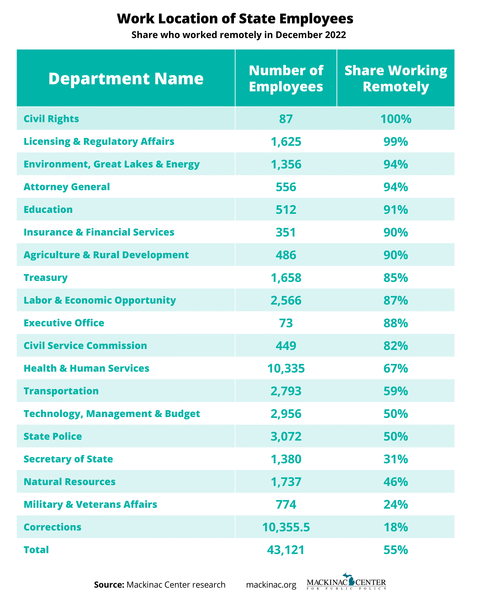It’s hard to know if remote work saves taxpayer money
Reporting requirement implemented for 2023 not in current budget
State agencies moved many employees to remote work during the COVID-19 pandemic. It is hard to know the long-term financial impact of that change, especially since the current state budget omits a reporting requirement from previous years.
The omnibus appropriations act for the 2023 fiscal year required agencies to compile quarterly reports on the number of full-time employees working remotely. They were also required to estimate the net savings incurred by remote work and any reduction in office space. The current budget contains no such requirement. A brief March 2023 report from the State Budget Office does not provide much certainty.
The share of employees working remotely varied greatly across agencies and departments, according to numbers compiled by the Mackinac Center. Only 18% of employees in the Department of Corrections worked remotely, perhaps due to the need for guards to report to prisons. Fewer than one-third of employees of the Secretary of State (30%) worked remotely. In seven agencies, by contrast, over 90% of employees worked remotely. These included the Department of Education, the Department of Agriculture and Rural Development, and the Department of Environment, Great Lakes and Energy. All 68 members of the executive office worked remotely.
Just over half of Michigan state employees worked remotely.
Each department determines its own remote work policy. Some departments are fully remote while others require employees to be in the office two or three days each week.
Expenses for building operations increased by $583,500 over the previous year, according to the most recent available data. The report said that price increases for janitorial and security services contributed to the increase, but building operational expenses are expected to decrease over the long term.
One surprising point from the report is that the state’s overall building expenses increased in 2022 after workers were offered long-term remote work. The state reported a $583,500 net increase in building operations in 2022 compared to 2021. It experienced an $851,594 decrease in operations in 2021.
The state budget office did not respond to an email asking for comment.
Utility expenses increased by $1.4 million in 2022, while they declined by $480,943 the previous year. Commodity price increases, combined with higher electricity and natural gas rates, were blamed for the increase.
The report said the state government owns or leases more than 41.5 million square feet of space. The amount of space decreased by 54,000 square feet in the 2022 fiscal year, and the Department of Technology, Management and Budget downsized or declined to renew 24 leases. The State Budget Office said the change saved roughly $18.7 million.
Spending on office supplies saw a $3.3 million net decrease and spending on information technology increased by $11 million.
Michigan Capitol Confidential is the news source produced by the Mackinac Center for Public Policy. Michigan Capitol Confidential reports with a free-market news perspective.


